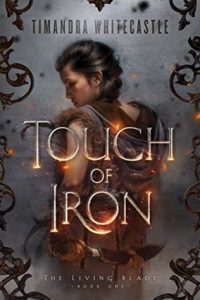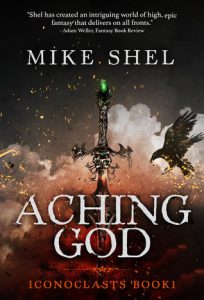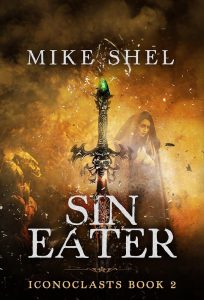Author Spotlight – Mike Shel
Joining us for today’s Author Spotlight is Mike Shel!
Mike Shel (not his real name) was born in Detroit, Michigan in 1964 and grew up in the suburb of Dearborn, the hometown of Henry Ford, genius industrialist and virulent anti-Semite nutjob. Mike has also lived in southern Illinois, Louisville, Kentucky, Atlanta, Georgia, and now Indianapolis, Indiana. After writing two adventures for Dungeon Magazine in the early 90s, he crawled down a deep, dark hole. He emerged 15 years later, Rip Van Winkle-like, looked around for a moment, then crawled back down again. Re-emerging after another 3 years, he rubbed the sleep from his eyes and began freelancing for Paizo Publishing and third-party publishers like Kobold Press and Legendary Games.
Mike is currently hard at work on his epic fantasy trilogy entitled Iconoclasts. The first two books, Aching God and Sin Eater are available in print and digital format on Amazon.com. He’s at work on the third and final volume, Idols Fall.
Mike has an advanced degree in clinical psychology and has practiced as a psychotherapist for over twenty years, specializing in cognitive therapy for panic and anxiety disorders. He has also worked with clients suffering from addiction, mood disorders, psychosis, and with survivors of trauma.
He lives in Indianapolis, Indiana with his beloved wife Tracy, son Leo, and dog Neko.
Welcome to the Hive, Mike. Let’s start small: tell us about a great book you’ve read recently!
I’m a terribly slow reader, and given the fact I have a demanding full-time job and need to write myself, I don’t have nearly as much time to read as I’d like. That said, I’ve nibbled away at several books of history, including The Tigress of Forli, Brunelleschi’s Dome, The House of Medici (sensing a theme?), and SPQR.
 But given this chance (and despite the fact I read it last year), I want to plug the first book in Timandra Whitecastle’s Living Blade trilogy, Touch of Iron. Tim’s a wonderful writer and her prose lives up to her books’ gorgeous covers.
But given this chance (and despite the fact I read it last year), I want to plug the first book in Timandra Whitecastle’s Living Blade trilogy, Touch of Iron. Tim’s a wonderful writer and her prose lives up to her books’ gorgeous covers.
Okay, time to escalate things: reality warps and you suddenly find yourself leading a D&D-style party through a monster-infested dungeon. What character class are you, and what’s your weapon of choice?
My idealized self is a fighter, clad in splint mail, wielding a wickedly sharp longsword, always in the thick of the battle.
But really? I’m the cleric, safely hidden in the middle of the group, ready to lay on the healing. In a pinch, I will frantically bash things into a paste with my flanged mace. (To prove both my nerd credentials and ancient D&D bona fides: I’d still prefer a sword, but clerics weren’t permitted edged weapons back in the day, save scimitars, which makes no sense at all.)
When you’re not frantically bashing your way through dungeons, how do you like to work? (In silence, with music, or serenaded by the damned souls of a thousand dead shrimps? Do you prefer to type or to hand-write? Are you an architect or a gardener? A plotter or a pantser? D’you write in your underwear, or in a deep-sea diver’s suit?) Tell us a little bit about your writing method!
I have the attention span of a gnat on a sugar high, distracted by objects of even modest shininess, so I need quiet to write. On rare occasions—during a lunar eclipse, for instance—I listen to instrumental music, such as this and this and this and this.
I sit somewhere in the middle of the plotter-pantser continuum: I tend to outline by chapter, with only a few sentences about what is generally supposed to happen in each, then follow where the muse leads, adding chapters or rearranging them as necessary.
 What (or who) are your most significant fantasy influences? Are there any creators whom you dream of working with someday?
What (or who) are your most significant fantasy influences? Are there any creators whom you dream of working with someday?
I grew up with Leiber, Howard, Moorcock (god help you trying to figure out where to start and how, with the endless money grab re-packaging that’s been done to his canon), LeGuin, Lovecraft, Zelazny, Peake, and Tolkien, in addition to a number of SF authors. Gene Wolfe was the first fantasy author to blow my mind as an adult with The Book of the New Sun. I know that people have mixed feelings about Wolfe, but I think New Sun is a masterpiece, plain and simple. It rekindled my love of fantasy. I’m a huge fan of Glen Cook’s Black Company books. I love China Mieville (especially his Bas Lag/New Crobuzon novels). I’ve loved much of Dan Simmons’ and Neil Gaiman’s work, along with N.K. Jemisin.
I’ve also consumed a great deal of historical fiction (James Clavell, Hilary Mantel, Colleen McCullough, Gary Jennings, Robert Graves). These days, 80% of my reading is nonfiction history.
What was the last thing you watched on TV and why did you choose to watch it? Alternatively, what games have you enjoyed recently?
The third episode of Chernobyl on HBO. It really is brilliant, both the writing and the acting. I decided to give the series a go because I so admired Jared Harris’s work in the also magnificent The Terror.
And this is a few years old, but I never pass up an opportunity to pimp one of my top ten films of all time, Arrival.
As for games…well, with a four year-old at home I find myself playing several Paw Patrol-inspired games, in addition to the always-entertaining and impromptu Why Is This Wet? Game (h/t to Quenby Olson).
The world shifts, and you find yourself with an extra day on your hands during which you’re not allowed to write. How do you choose to spend the day?
Reading. Reading, dammit.
 Can you tell us a little something about your current work(s) in progress?
Can you tell us a little something about your current work(s) in progress?
I’ve written the opening chapter to the third book of my Iconoclasts trilogy, Idols Fall, but I’ve been away from the writing desk for a few weeks between the release of Sin Eater and family vacations. I’m also in the process of touching up a short story featuring a character from Aching God (Lumari, the sour alchemist) that takes place at the same time as the events in Sin Eater.
My priority is finishing the trilogy—it will get done first. That being said, I have an idea for (at least) one novel set 200-300 years after the events of Iconoclasts, in an analogue of North America, colonial lands and a wild frontier. (I banged out an opening chapter for this as well, while the juices were flowing.) I have another idea for a novella or novel set in lands of Azkaya, the historical rivals of the trilogy’s featured empire.
What’s the most (and/or least) helpful piece of writing advice you’ve ever received?
I’ve talked about this before, but I will never stop singing the praises of this particular miraculous writing advice: whenever you sit down to write, do a single, brief editorial pass over whatever you wrote the day before, then pick up where you left off. For me, that resulted in a 132K word first draft of my debut novel in 10 weeks after literal decades of getting bogged down in the first 20 pages of many failed projects.
Every writer encounters stumbling blocks, be it a difficult chapter, challenging subject matter or just starting a new project. How do you motivate yourself on days when you don’t want to write?
Early on I played with the maps of the world. I’ve always been enamoured by maps and they access a different part of the creative brain and can sometimes help push through roadblocks. There were no maps to play with for the first draft of Sin Eater. When I found myself moving like molasses at one point, probably about 45K words deep, I did something I had never done before: I jumped ahead to a part of the novel I was really excited about writing. That enabled me to get productive again. Somehow, that helped me to figure out what was bogging me down. I went back to my impasse and the words started flowing again.
If you could visit any country at any point in history, where/when would you go, and why?
I’m a pretty big history nerd, so this is a tough question. It would be a toss-up between Florence, Italy at the height of the Renaissance and Rome during several eras of the Roman Empire, including the late Republic and early Imperial period. It would be hard to pick a specific year, though I would make sure I avoided various plagues, purges, and pogroms. I would most definitely steer clear of the years when Girolamo Savonarola held power over Florence. I couldn’t stomach watching Botticelli burn some of his paintings. I’d likely pass on Pompeii in 79AD as well.
Tell us about a book that’s excellent, but underappreciated or obscure.
Roger Zelazny is most well-known for his Chronicles of Amber. But I love a little-known gem of his, a tiny barely-novel called Jack of Shadows. Amazing world-building in this thin tome. I really wish he had given us more than 218 pages of it.
Finally, would you be so kind as to dazzle us with an elevator pitch? Why should readers check out your work?
Sweet Jebus, I suck at elevator pitches. So I’m gonna take the coward’s way out and reprint a review of my first book, Aching God, written by Alec Hutson, author of The Crimson Queen and The Silver Sorceress. After seeing this, I wanted to read me. Thank you, Alec!
“Oh my, yes. What a terrific read. I really hope Mike Shel’s Aching God is a harbinger of where the fantasy genre is headed. Not childish or simplistic, but also not gory, dull, dreary grimdark. Well-crafted fantasy for adults that presents a complex, interesting story in a faceted world (with some grayness), yet manages to elicit a sense of wonder in the reader. The character of Auric – solid, grounded, flawed, but a good man – is a welcome respite from an endless parade of anti-heroes. And I love that Mr. Shel managed to craft a realistic fantasy world about that most beloved of fantasy tropes – delving into forgotten ruins in search of ancient treasures. This is the novel that kids who played D&D 20 years ago deserve. Greatly enjoyed.”
That’s a brilliant review! Thanks again for joining us, Mike, and good luck writing book three!
Mike Shel is the author of the Iconoclasts trilogy. Books one and two, ACHING GOD and SIN EATER, are available now.
![]()

